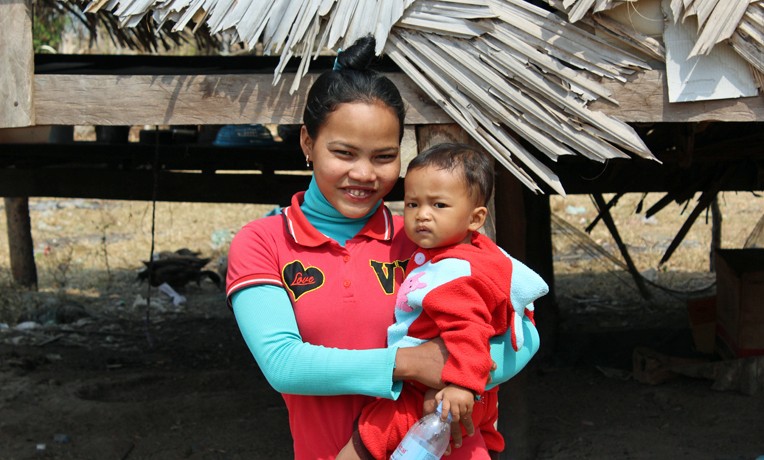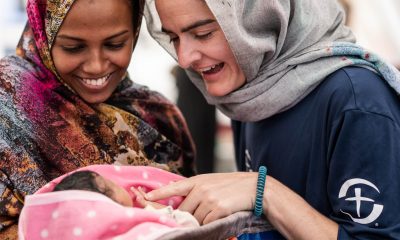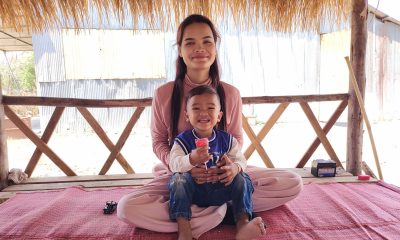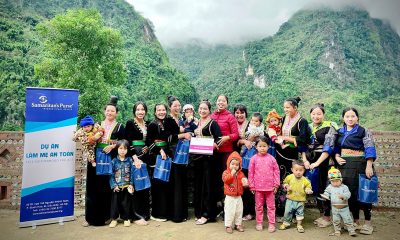A young woman learns how to care for her second child after losing her first
The thought of not knowing what makes a food healthy is foreign to my Western mind. Growing up, I learned to associate good health with vegetables and fruit from my parents at home, teachers in the classroom, and even from the advertisements on TV. If I have a question about whether a food is healthy for me, I can access a vast, online network of information just by raising my thumb.
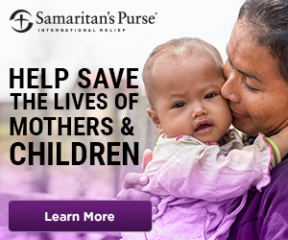 However, many Cambodians don’t live with the same luxuries I do. For many of them, nutrition is an unfamiliar word; they simply consume white rice with some barbequed fish, and elder relatives are their sources for recipes and information. Diep Phak, a 23-year-old mother, lived this way before she became part of a Samaritan’s Purse health program.
However, many Cambodians don’t live with the same luxuries I do. For many of them, nutrition is an unfamiliar word; they simply consume white rice with some barbequed fish, and elder relatives are their sources for recipes and information. Diep Phak, a 23-year-old mother, lived this way before she became part of a Samaritan’s Purse health program.
Mrs. Phak raises her 9-month-old son while her husband works on a construction site during the day. She lives in Voat village, a rural community in Kratie province, and is grateful that Samaritan’s Purse chose her village as one of the target areas for their maternal, infant, and child health project because many young mothers have struggled in her community. Her gratitude is clear by the way she invited me, and two other project staff members, inside her home to sit with her on her wooden floor.
Immediately, she began telling me her story. Four months ago, she lost her eldest child.
“No one told me how to take care of her,” she said.
Mrs. Phak was around my age when she had her first daughter, but, unlike me, she didn’t have information on healthy food and newborn care at her fingertips; she was newly married and living in a small, one room hut with her husband.
“I did not go to the health center to give her vaccinations when she was born, and I did not breastfeed her, either,” she said.

Diep Phak’s 9-month-old son
The baby’s ill health became tangible in a large ulcer that formed on her shoulder, and it quickly became infected. The baby girl was already small because Mrs. Phak didn’t know how to prepare nutritious meals for her, and her immunity wasn’t high enough to fight off the infection. Eventually, the infection got worse, and the child passed away.
Despite this tragic situation, Mrs. Phak still has courage, hope, and faith in her family’s future because of her involvement with Samaritan’s Purse. Throughout the past 10 months, she has attended hygiene training on clean water, marched in a safe motherhood campaign, learned to make nutrient-dense porridge for her little boy, and taken him to the health center to utilize the services they offer. She has been able to directly apply everything she has learned at home as she cares for her son each day. Her favorite activity was the safe motherhood campaign because the topic is close to her heart after losing her daughter.
“My first child died because I did not know how to be a mother and take care of my baby,” she said. “I did not know how much food, or what kind of food, to feed her. Now, I feel happy because I know how to care for my second child.”
Currently, Samaritan’s Purse staff members regularly visit Mrs. Phak. She prepares the nutritious recipes she learned in training sessions for her baby boy almost every day. Without the help of Samaritan’s Purse, she said she would be afraid of losing this child also. She’s excited to watch her boy grow healthy and strong; she wants him to attend school as soon as he is old enough.
Her husband is also pleased with all the motherhood skills she has learned. Now that she knows how to be a mother, he feels comfortable letting her care for their son while he is away at work.
The Samaritan’s Purse staff members have shared the Gospel message with Mrs. Phak and are praying that the sorrow she experienced will draw her closer to the Lord.
“That means God loves all his people all over the world,” she said about the Gospel.

Diep Phak making nutritious food for her son
She feels like the help of Samaritan’s Purse with her second child’s health was a blessing from God. Although Samaritan’s Purse is no longer conducting these classes in Mrs. Phak’s village, she’s confident that the community of young mothers she found through the project will continue encouraging and uplifting one another in the days ahead.
I (ungracefully) climbed down the ladder outside her home while she stood in the doorway with her hands in a prayer position by her chin—an upmost form of flattery in Cambodia. I don’t know if the harsh reality of Mrs. Phak’s story will ever settle in my mind, but I’m thankful that Samaritan’s Purse is active in places of brokenness like these. Where there is little knowledge of motherhood and health, Samaritan’s Purse is and will continue bringing hope, security, and the Gospel to communities.

